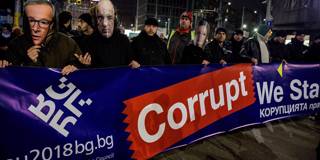The European Union’s recent agreement to issue joint debt to support post-pandemic economic recovery represents an unprecedented step toward deeper integration. But the success of the effort will depend on how the financial relief is allocated and monitored.
BRUSSELS – The European Union’s post-pandemic recovery plan represents a historic opportunity – as well as a major risk. After intense negotiations, the EU agreed to issue joint debt – for the first time ever – to finance the Recovery and Resilience Facility, a common fund that will provide grants and loans to EU member states to green the economy, digitalize our public administrations, and reform the bloc’s sluggish economies. But, for all the praise the new fund deserves, its success will be judged by its outcome.
In short, Europeans expect results, not scandals. These EU recovery funds cannot end up being syphoned off for fraudulent schemes. The prospects of a closer and more robust fiscal union will be damaged if all that Europeans remember from the recovery effort is that the funds benefited corrupt politicians, cronies, and con artists.
The European Parliament was aware of this danger when creating the Recovery and Resilience Facility. As a result, the legal text governing the distribution of funds includes stringent obligations on reporting and transparency, as well as essential oversight roles for the EU’s monitoring bodies: the European Anti-Fraud Office, the newly operational European Public Prosecutor’s Office, and the European Court of Auditors.

BRUSSELS – The European Union’s post-pandemic recovery plan represents a historic opportunity – as well as a major risk. After intense negotiations, the EU agreed to issue joint debt – for the first time ever – to finance the Recovery and Resilience Facility, a common fund that will provide grants and loans to EU member states to green the economy, digitalize our public administrations, and reform the bloc’s sluggish economies. But, for all the praise the new fund deserves, its success will be judged by its outcome.
In short, Europeans expect results, not scandals. These EU recovery funds cannot end up being syphoned off for fraudulent schemes. The prospects of a closer and more robust fiscal union will be damaged if all that Europeans remember from the recovery effort is that the funds benefited corrupt politicians, cronies, and con artists.
The European Parliament was aware of this danger when creating the Recovery and Resilience Facility. As a result, the legal text governing the distribution of funds includes stringent obligations on reporting and transparency, as well as essential oversight roles for the EU’s monitoring bodies: the European Anti-Fraud Office, the newly operational European Public Prosecutor’s Office, and the European Court of Auditors.